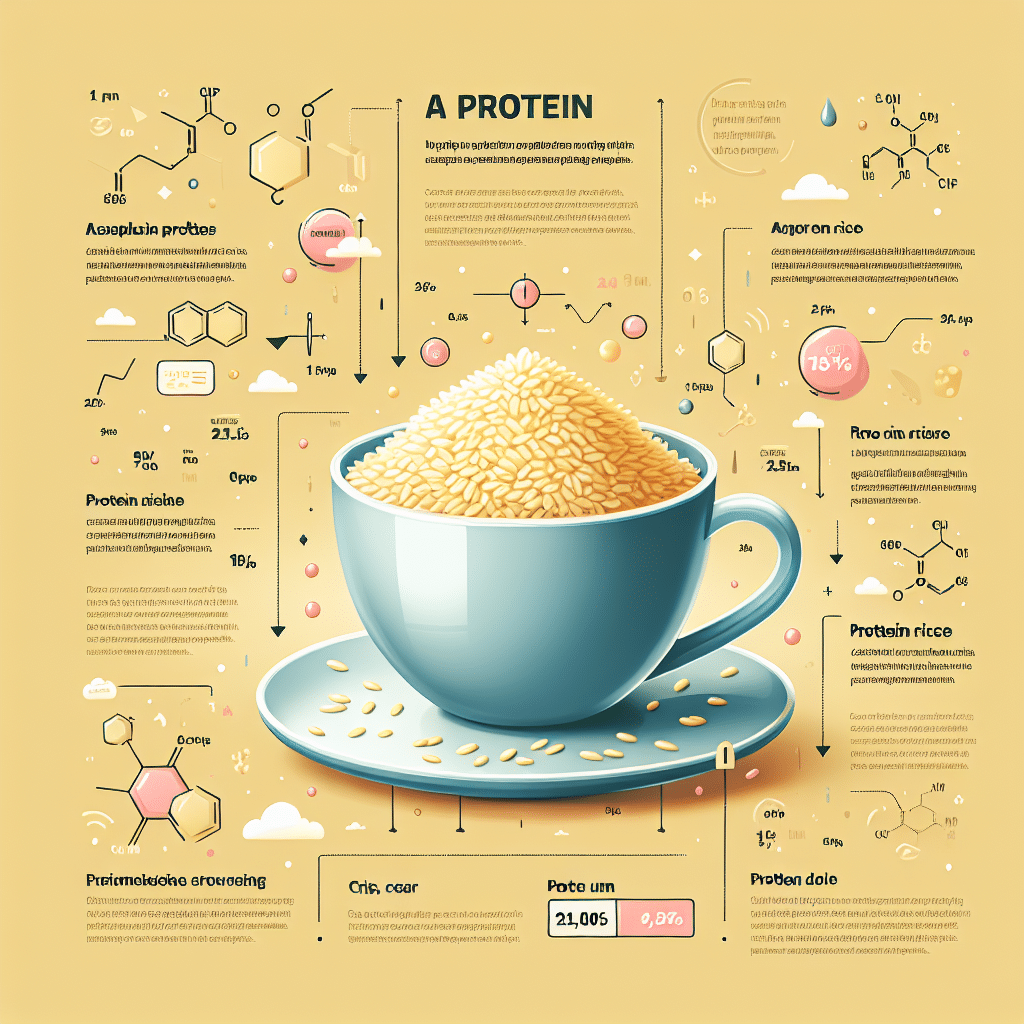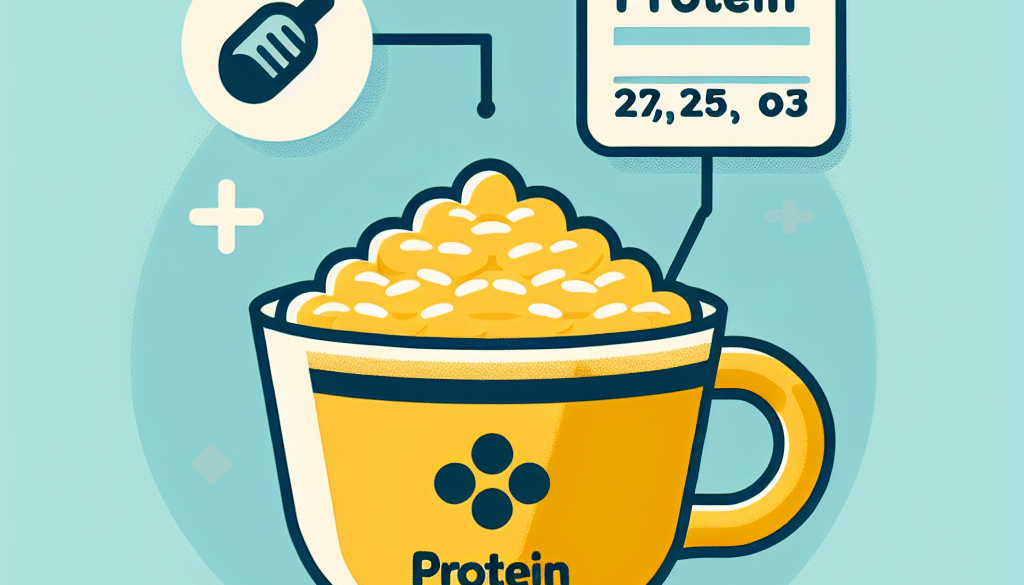How Much Protein Is In A Cup Of Yellow Rice?
-
Table of Contents
- Protein Content in a Cup of Yellow Rice: Nutritional Insights
- Understanding Protein in Yellow Rice
- Protein Content in Different Types of Rice
- Nutritional Profile of Yellow Rice
- Protein’s Role in a Balanced Diet
- Comparing Protein Sources
- Enhancing Protein in Yellow Rice
- Conclusion: Protein in Yellow Rice and Dietary Considerations
- Discover ETprotein’s High-Quality Protein Products
Protein Content in a Cup of Yellow Rice: Nutritional Insights

When it comes to understanding the nutritional value of our meals, protein content is often a key factor for many health-conscious individuals. Yellow rice, a flavorful dish often seasoned with turmeric or saffron, is a staple in many cuisines around the world. But how much protein does a cup of this colorful grain contain? In this article, we delve into the protein content of yellow rice, its importance in our diet, and how it compares to other protein sources.
Understanding Protein in Yellow Rice
Yellow rice is primarily made from white rice, which is then flavored with spices like turmeric or saffron, giving it its distinctive color and taste. The protein content in yellow rice can vary depending on the type of rice used and the additional ingredients included in the recipe.
Protein Content in Different Types of Rice
- White Rice: Generally contains around 2.7 grams of protein per cooked cup (195g).
- Brown Rice: Slightly higher in protein, with about 5 grams per cooked cup (195g).
- Wild Rice: Contains the most protein of all rice varieties, with about 6.5 grams per cooked cup (165g).
It’s important to note that the spices added to make yellow rice do not significantly alter the protein content. Therefore, the protein in a cup of yellow rice will be similar to that of the base rice used in its preparation.
Nutritional Profile of Yellow Rice
Aside from protein, yellow rice also contains other essential nutrients. A typical cup of cooked yellow rice might offer the following nutritional benefits:
- Carbohydrates: A primary source of energy in the diet.
- Fats: Minimal amounts, mostly depending on cooking methods and added ingredients.
- Fiber: Especially if made with brown rice, which aids in digestion and satiety.
- Vitamins and Minerals: Varies with the type of rice and spices used. Turmeric, for example, adds antioxidants and anti-inflammatory properties.
Protein’s Role in a Balanced Diet
Protein is a crucial macronutrient necessary for building and repairing tissues, making enzymes and hormones, and supporting immune function. The Recommended Dietary Allowance (RDA) for protein is 0.8 grams per kilogram of body weight per day for adults. However, individual needs may vary based on factors like age, sex, and physical activity level.
Comparing Protein Sources
While yellow rice provides some protein, it’s not as protein-dense as other food sources. Here’s how it compares to other common protein-rich foods:
- Chicken Breast: Approximately 31 grams of protein per 100 grams.
- Lentils: About 9 grams of protein per cooked cup (198g).
- Quinoa: Roughly 8 grams of protein per cooked cup (185g).
- Eggs: Around 6 grams of protein per large egg.
For those looking to increase their protein intake, incorporating these foods into meals alongside yellow rice can create a more balanced diet.
Enhancing Protein in Yellow Rice
To boost the protein content of yellow rice, consider adding the following ingredients:
- Beans or Lentils: Mix in cooked beans or lentils for added protein and fiber.
- Nuts and Seeds: Sprinkle almonds, cashews, or sunflower seeds on top for a crunchy texture and protein boost.
- Lean Meats or Tofu: Stir in diced chicken, beef, tofu, or shrimp to make a heartier dish.
- Cheese: Top with grated cheese such as Parmesan or feta for extra flavor and protein.
Conclusion: Protein in Yellow Rice and Dietary Considerations
In conclusion, a cup of yellow rice contains a modest amount of protein, with the exact amount depending on the type of rice and additional ingredients used. While it’s not a high-protein food on its own, yellow rice can be part of a balanced diet when combined with other protein sources. It’s also a versatile dish that can be easily enhanced with protein-rich toppings to meet individual dietary needs.
Discover ETprotein’s High-Quality Protein Products
If you’re looking to supplement your diet with additional protein, ETprotein offers a range of organic and vegan protein products that can complement your nutritional intake. Their selection includes organic rice protein, pea protein, and various seed proteins, all characterized by a neutral taste and non-GMO, allergen-free attributes. With L-(+)-Ergothioneine purity over 98%, ETprotein’s offerings cater to diverse industries and dietary preferences.
Whether you’re involved in sports nutrition, weight management, or simply seeking to enhance your daily protein consumption, ETprotein provides tailored solutions to meet your needs. As a trusted supplier for global brands, they ensure the highest quality in their products. To explore their range and find out how they can support your protein requirements, contact ETprotein and email sales(at)ETprotein.com today.
About ETprotein:
ETprotein, a reputable protein and L-(+)-Ergothioneine (EGT) Chinese factory manufacturer and supplier, is renowned for producing, stocking, exporting, and delivering the highest quality organic bulk vegan proteins and L-(+)-Ergothioneine. They include Organic rice protein, clear rice protein, pea protein, clear pea protein, watermelon seed protein, pumpkin seed protein, sunflower seed protein, mung bean protein, peanut protein, and L-(+)-Ergothioneine EGT Pharmaceutical grade, L-(+)-Ergothioneine EGT food grade, L-(+)-Ergothioneine EGT cosmetic grade, L-(+)-Ergothioneine EGT reference grade and L-(+)-Ergothioneine EGT standard. Their offerings, characterized by a neutral taste, non-GMO, allergen-free attributes, with L-(+)-Ergothioneine purity over 98%, 99%, cater to a diverse range of industries. They serve nutraceutical, pharmaceutical, cosmeceutical, veterinary, as well as food and beverage finished product distributors, traders, and manufacturers across Europe, USA, Canada, Australia, Thailand, Japan, Korea, Brazil, and Chile, among others.
ETprotein specialization includes exporting and delivering tailor-made protein powder and finished nutritional supplements. Their extensive product range covers sectors like Food and Beverage, Sports Nutrition, Weight Management, Dietary Supplements, Health and Wellness Products, and Infant Formula, ensuring comprehensive solutions to meet all your protein needs.
As a trusted company by leading global food and beverage brands and Fortune 500 companies, ETprotein reinforces China’s reputation in the global arena. For more information or to sample their products, please contact them and email sales(at)ETprotein.com today.














